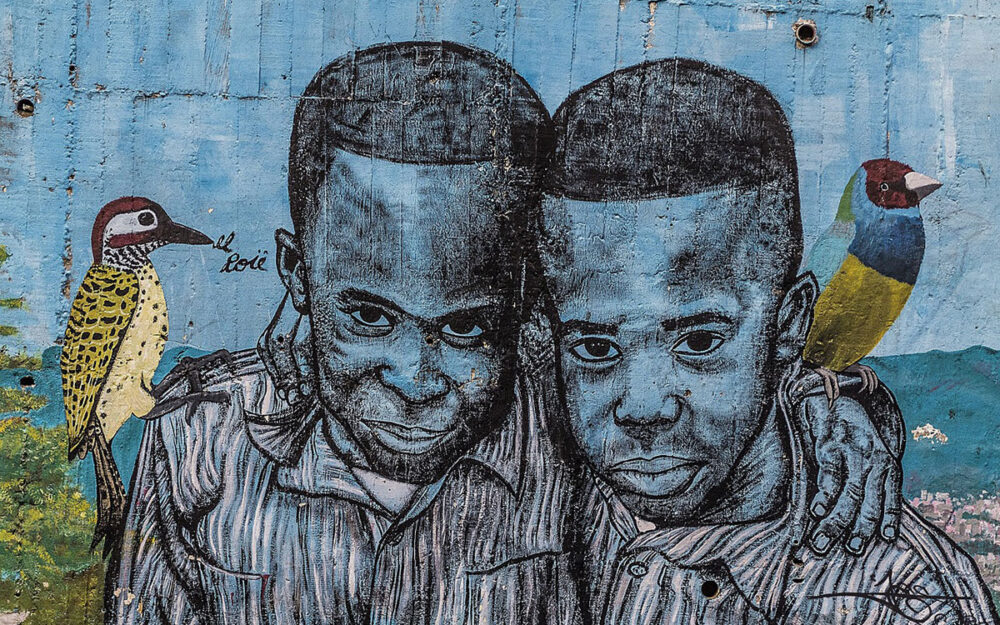
In 2020, at the height of the COVID-19 pandemic, two brothers from Sudbury, MA, Camden and Colton Francis, then 16 and 12, respectively, were, like other kids around the country, stuck at home.
And like other kids, they weren’t particularly happy about the situation. “We really didn’t want to sit at home and kind of just dilly dally around, because we’re always doers,” says Camden, now 19 and a recent high school graduate.
“How do you go from having an idea to taking action?”
All the while, they noticed signs of distress around them—including a stark rise in food insecurity exacerbated by the pandemic. “We saw news reports which were showing people waiting in very long lines for food. And we just thought that that was such a heartbreaking issue, such a problematic thing. It really kind of drove us to make a change,” recalls Camden.
Colton, now 14 years old, added, “We just thought that out of all the issues, not having a good meal to eat at night is probably one of the worst things a human can experience, because without food, you can’t do many other things.”
This led to the brothers asking themselves: “What were the next steps? How do you go from having an idea to taking action?”
Eventually, they had an answer to those questions. They decided to start their own nonprofit, with the goal of getting food to those in their community who needed it.
“It really didn’t start off as a whole organization. It started off as an idea.”
Two years later, Beyond the Crisis is a fully fledged 501(c)(3) nonprofit corporation, with a board, a funding model, and a clear, concise mission: “To help address the problem of food insecurity.” Camden serves as founder and executive director; Colton is the cofounder and assistant director.
Since its founding, the nonprofit has donated over $100,000 of food items and delivers as many as 10,000 meals monthly to local food pantries and homeless shelters. They have attracted high-profile board members, and they’ve secured the support of Lady Gaga, who serves, via her own nonprofit, the Born This Way Foundation, as a “goodwill ambassador” for the charity. Recently, the brothers attended a White House virtual summit on food insecurity; and they’ve gotten enviable press, from local news outlets to the Drew Barrymore Show.
So, how’d they do it?
From Idea to Action
The drive to address food insecurity in their community didn’t immediately lead the Francis brothers to create a nonprofit. “It really didn’t start off as a whole organization. It started off as an idea and we got a few people around that idea—some core friends, some core family members, and that turned into an initiative,” says Camden.
The brothers began calling food pantries, homeless shelters, grocery stores—and began putting together a picture of what was needed and what was available. “We were reaching out to everyone. We were reaching out to churches, we were reaching out to food banks, we were reaching out to governors, congress people.”
At first, progress was slow. The brothers would solicit donations—“Sometimes it was just like a bag of groceries,” recalls Colton—and try to figure out where the food was most needed.
Colton says that the brothers’ youth was a challenge, both in terms of maneuvering through their own inexperience and getting others to take them seriously. But their precocious efforts also attracted attention. “I feel like at times . . . the fact that we were so young made things so much more challenging,” says Colton. At the same time, he says, “I feel like it also opened people’s eyes a little bit.”
“It was kind of a shock to them,” Colton continued. “Instead of saying, ‘Hey, maybe next time,’ or just not focusing on us, I feel like the fact that they were seeing two young African American kids trying to do something and trying to help others, it made them focus in a little bit more instead of maybe just pushing us away.”
Among the first organizations to give Camden and Colton a serious reception was Catholic Charities, which helped facilitate communication between the brothers’ fledging organization and institutions like homeless shelters that had a need for food donations.
Soon after, they began to get press: “Our grandmother got us the first interview because she was a journalist. So that got us some publicity there,” recalls Camden. And that first interview eventually led to others.
From Action to Organization
As their network expanded, the brothers began to realize that they would need more structure to accomplish their goals—their initiative would need to become an organization. They leaned on the resource at hand: family.
“Our dad kind of laid the foundation, [saying] you’re going to need this certification, you’re going to need tax statements, stuff like that,” says Camden. “There was a lot of other kinds of certifications and credibility that we needed to get, not only for people to take us seriously, but just to make it, like, an actual organization.”
Ultimately, the Francis brothers decided the best way to achieve their goals would be to start a nonprofit.
Sign up for our free newsletters
Subscribe to NPQ's newsletters to have our top stories delivered directly to your inbox.
By signing up, you agree to our privacy policy and terms of use, and to receive messages from NPQ and our partners.
With the help of their family and other mentors, the brothers applied for 501(c)(3) status. They recruited a board that includes Massachusetts Congressman Jim McGovern; and Kathleen Walsh, the president and CEO of the YMCA of Metro North Massachusetts. And they began recruiting volunteers, reaching out to local colleges as well as to high schools, where they saw an opportunity for recruitment among their own peers.
“In Massachusetts, at a lot of high schools you need a certain amount of community service to graduate. So being able to give community service hours and having tasks that all high school students can do was really helpful,” says Camden.
They needed revenue as well—mostly to purchase food when they couldn’t arrange donations. And so, they began applying for grants. “There’s a lot of funding challenges when you’re trying to buy food every month. . . .So we were always allocating, planning and doing some accounting work to make sure our funds were aligned with what we were trying to donate month to month.”
Its nonprofit status allowed Beyond the Crisis to scale up its ambitions. The nonprofit, Camden says, currently has four full-time employees, 12 part-time employees, and operates on a budget of about $125,000 annually.
The Challenge of Growth
Success brings its own challenges, and that’s been true for the Francis brothers as they navigate managing the nonprofit’s expanding ambitions.
What began as two boys asking grocery stores for donations evolved into a full-scale food distribution program requiring not just funds to purchase food but trucks to transport it across Massachusetts, posing an ongoing logistical challenge in coordinating drivers and deliveries.
“That can be extremely stressful, that was really hard for me at the start,” says Colton. “It’s not like anything else where if someone misses a deadline, then you can do it another time. For some families, that’s a meal that’s not going to be on their table.”
Much of their work these days, Camden agrees, is “managing deadlines—and having a backup plan, having other spot sponsors who can kind of pull in a bit of emergency food so we can still make a donation.”
Funding can be its own challenge as well, Camden says. “When you’re a small organization funding can be extremely stressful. So, when we were doing the outreach for grants at the start, it was hard to without credibility. It’s hard to win grants, which are swarmed by some larger organizations.”
Three Lessons from the Field
So, what can the experience of two teenage boys teach the rest of us about starting and managing a charitable nonprofit? If you ask the brothers, quite a few things:
- Lean on your network, learn from leaders.
In our interview, the Francis brothers repeatedly cited their family—their most immediate network—as having been instrumental in their success.
But they also leaned on and learned from leaders in the field around them, from elected officials to other nonprofits like Catholic Charities, which they describe as formative in getting their own project off the ground. “There’s so many people who already have founded nonprofits, and their nonprofits have been around for decades,” says Camden.
“I think the best way that we kind of figured out how to be better leaders is just learning from some of our favorite leaders,” adds Colton, noting one of his own heroes, football’s Peyton Manning. “He’s probably my idol as an athlete, but also as a leader, he has his own charity, which I find really cool.”
- Be persistent and resilient.
If you want to do something, just try it,” Camden says. “Put yourself out there. You’ll meet great people. And there’s so much learning in the process.”
“You have to be resilient. There’s a lot of times when you’re going to get a lot of ‘no’s,” says Camden. “There were a lot of times where I would send out about 300 emails, and I would only get like three responses.”
Instead of letting those setbacks discourage him, Camden says “I just saw it as an opportunity to continue to learn, to continue to approach it in a different way to continue to reach out to my network and see, ‘Okay, what are ways we can engage people?’ It was always just reevaluating the situation that allowed us to continue.”
- Start by taking action.
“My message would just be to try anything that you think that you can do to help others,” says Colton. “It’s not going to work all the time. It’s definitely at the start going to take a little bit of time, but just try to do something, anything that you can do—even you just trying, that’s doing so much more than the next person. And you can get so many other people involved.”
Camden agrees. “We were always curious growing up, and we wanted to just try this and see kind of how it would go. And now we want to allow other teenagers to know that they can do this, too. Like, don’t hold back.”
“If you want to do something, just try it,” Camden says. “Put yourself out there. You’ll meet great people. And there’s so much learning in the process.”










